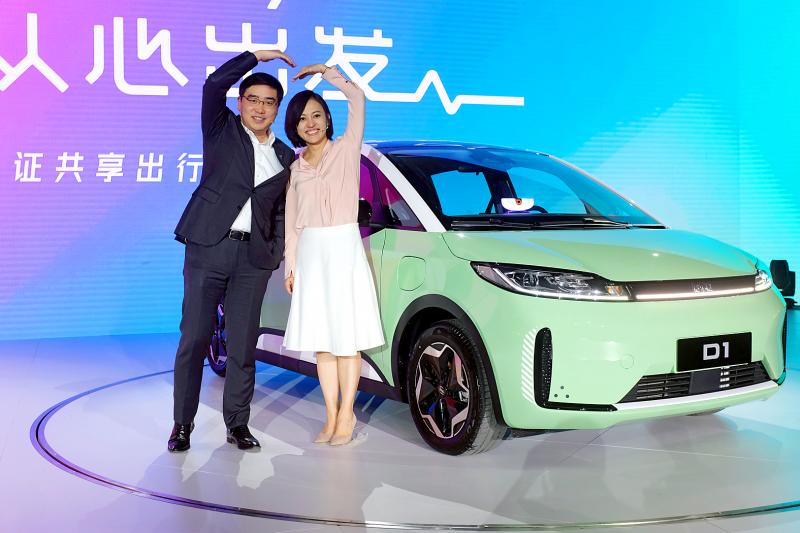Didi Chuxing (滴滴出行) is to begin rolling out an electric vehicle developed with BYD Co (比亞迪) to its drivers, aiming to reduce costs in the world’s largest ride-hailing network.
The D1, the first model to have been built with ride-hailing in mind, is to ship to the start-up’s leasing partners across several Chinese cities, Didi Chuxing said.
Made by BYD, in which Warren Buffett’s Berkshire Hathaway Inc is the largest shareholder, the vehicle has power-sliding doors and a driver assistance system.

Photo: Reuters
Didi Chuxing in 2018 flagged its intention to team up with automakers to produce customized electric vehicles for its ride-hailing service.
The firm that defeated Uber Technologies Inc in China is hoping the D1 presents a more efficient option than traditional gasoline-powered vehicles.
It already hosts about 1 million electric vehicles, which can take advantage of a growing nationwide charging network, and provides as many as 60 million rides per day.
The company, valued at US$62 billion according to CB Insights, is still recovering from a 2018 regulatory crackdown on its vehicle-pooling service and the COVID-19 pandemic that has curtailed most transportation.
Rival Internet platforms such as Meituan Dianping (美團點評) are now challenging Didi Chuxing’s leadership in ride-hailing. To compete, the company is expanding into adjacent businesses, from bike sharing to grocery delivery, to attract and keep users.
Monthly active users across Didi Chuxing’s platforms in China have surpassed 400 million, it said this month.
Longer term, it is betting on autonomous driving — a hived-off unit that received US$500 million in funding from Softbank Group Corp’s Vision Fund. Its shares trade privately at a discount of as much as 40 percent to its peak valuation, Bloomberg reported this year.

South Korea’s equity benchmark yesterday crossed a new milestone just a month after surpassing the once-unthinkable 5,000 mark as surging global memory demand powers the country’s biggest chipmakers. The KOSPI advanced as much as 2.6 percent to a record 6,123, with Samsung Electronics Co and SK Hynix Inc each gaining more than 2 percent. With the benchmark now up 45 percent this year, South Korea’s stock market capitalization has also moved past France’s, following last month’s overtaking of Germany’s. Long overlooked by foreign funds, despite being undervalued, South Korean stocks have now emerged as clear winners in the global market. The so-called “artificial intelligence

NEW IDENTITY: Known for its software, India has expanded into hardware, with its semiconductor industry growing from US$38bn in 2023 to US$45bn to US$50bn India on Saturday inaugurated its first semiconductor assembly and test facility, a milestone in the government’s push to reduce dependence on foreign chipmakers and stake a claim in a sector dominated by China. Indian Prime Minister Narendra Modi opened US firm Micron Technology Inc’s semiconductor assembly, test and packaging unit in his home state of Gujarat, hailing the “dawn of a new era” for India’s technology ambitions. “When young Indians look back in the future, they will see this decade as the turning point in our tech future,” Modi told the event, which was broadcast on his YouTube channel. The plant would convert

‘SEISMIC SHIFT’: The researcher forecast there would be about 1.1 billion mobile shipments this year, down from 1.26 billion the prior year and erasing years of gains The global smartphone market is expected to contract 12.9 percent this year due to the unprecedented memorychip shortage, marking “a crisis like no other,” researcher International Data Corp (IDC) said. The new forecast, a dramatic revision down from earlier estimates, gives the latest accounting of the ongoing memory crunch that is affecting every corner of the electronics industry. The demand for advanced memory to power artificial intelligence (AI) tasks has drained global supply until well into next year and jeopardizes the business model of many smartphone makers. IDC forecast about 1.1 billion mobile shipments this year, down from 1.26 billion the prior

People stand in a Pokemon store in Tokyo on Thursday. One of the world highest-grossing franchises is celebrated its 30th anniversary yesterday.